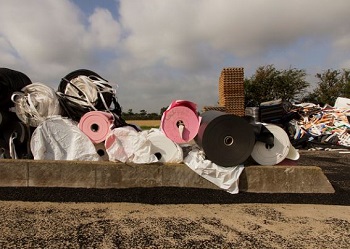
WASHINGTON, DC, March 2, 2016 (ENS) – The Plastics Industry Trade Association Monday launched the Zero Net Waste program, a tool for members to use to evaluate waste reduction opportunities and maximize landfill diversion.
The ZNW program will provide plastics companies with a concrete set of resources they can use to pursue, and achieve, zero net waste in their facilities and offices.

The Society of the Plastics Industry, SPI, now known as the Plastics Industry Trade Association, or just SPI, set up an Emerging Trends Subcommittee as part of its Recycling Committee. Chaired by Kathy Xuan, CEO of PARC Corp, the subcommittee came up with the Zero Net Waste idea, which was then developed by a broader workgroup of SPI members.
“As chair of the subcommittee and a recycler who provides zero landfill services,” said Xuan, “we feel this program will be instrumental in providing tools and resources to accelerate the industry’s pursuit of zero waste.”
Zero Net Waste, ZNW, is not a program that requires independent, third-party verification for participation, but there are requirements.
Qualification and verification occur in two stages. Once a company commits to pursuing zero waste as an office, manufacturing facility or at a corporate-wide level, they must fill out and submit the Qualification document. Completion of this step indicates the company has implemented the pieces necessary to begin the journey to zero net waste.
As a company documents success in diversion, they may submit the verification checklist and supporting documentation that demonstrates this success.
After verification, a company is permitted to use the ZNW logo on marketing pieces. At the beginning of each calendar year, companies will be reminded to submit the necessary information to demonstrate ongoing, annual verification.
Verification seeks to demonstrate the zero net waste efforts remain active and diversion goals are being met, or corrective measures are being taken if goals are not being met. All information submitted to SPI for qualification and verification will be maintained as confidential.
The cornerstone of the Zero Net Waste program is the manual, which includes real-world, step-by-step tools and resources for companies throughout the plastics value chain to ensure that plastic materials and other manufacturing byproducts are put to their highest and best use.
From building the business case for pursuing zero net waste, to educating employees and offering practical guidance on finding the right service providers, the ZNW program manual is designed to enable companies of all sizes to take immediate steps to begin pursuing zero waste in their facilities.

Companies who participate in the program, and meet requirements of the two-step qualification and verification process will be recognized for their efforts.
Robert Flores, director of sustainability for Berry Plastics said, “The Zero Net Waste Program isn’t just for companies looking for Zero Waste certification. The accompanying manual is applicable to a wide variety of companies and provides the basics for how get started, as well as how to enhance existing programs that a company already may have in place.”
Reducing reliance on landfills provides both environmental and economic benefits, which are being driven by many of the major brand owners in the plastics industry today, says Nina Goodrich, executive director of GreenBlue.
“GreenBlue and the Sustainable Packaging Coalition support SPI’s Zero Net Waste Program,” she said. “Providing companies the tools and resources to demonstrate leadership in landfill diversion is an important step towards reducing carbon emissions and developing a circular economy.”
Founded in 1937, SPI: The Plastics Industry Trade Association, promotes growth in the $427 billion U.S. plastics industry, which employs nearly one million American workers.
Copyright Environment News Service (ENS) 2016. All rights reserved.
